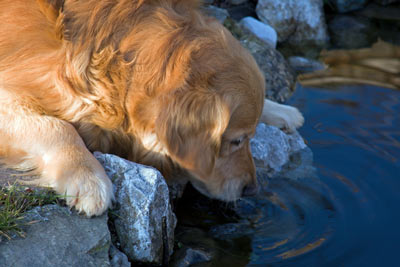Leptospirosis in Dogs

Leptospirosis, or lepto, is an illness caused by various species of Leptospira bacteria. It is a zoonotic illness, so humans can contract it from animals. Usually, dogs pick up the bacteria from drinking standing water that has urine from an infected wild animal in it. Then, the human gets the bacteria from their dog's urine.
Today, more lepto cases in dogs are being reported than in previous years, but this is not a new disease. Rather, better diagnostic tests are available, veterinarians are more attuned to its signs, and development into more wild areas by humans has increased dogs' exposure to it.
How Is Lepto Transmitted?
Lepto is released into the environment in the urine of an infected animal. Another animal, such as a dog, becomes infected by the bacteria when they come into contact with the urine, either through a break in the skin, via the mucous membranes, or by drinking infected water. Similarly, humans are infected when bacteria gets into their system through breaks in the skin or when they contact their dog's infected urine and then eat something without washing their hands.
Signs of Leptospirosis in Dogs
Some dogs do not show any signs of illness when they are infected with Leptospira bacteria. When they do show signs, they usually appear between 4 and 14 days after the initial infection and may include:
- Fever
- Muscle pain
- Blood in the urine or cloudy urine
- Decrease or loss of appetite
- Lethargy
- Vomiting
- Diarrhea
- Jaundice
- Urinary accidents
In severe cases, leptospirosis can lead to kidney failure or liver failure. The bacteria can rarely also trigger various immune-mediated disorders, resulting in a variety of other signs and a complicated diagnosis.
Diagnosis of Leptospirosis in Dogs
Routine lab tests such as urinalysis, CBC, and basic blood chemistries may reveal clues that, along with the history and clinical signs, point the veterinarian in the direction of leptospirosis. These results can include high numbers of white blood cells in the urine and CBC, dilute urine, and evidence of liver and kidney involvement.
If lepto is suspected, the veterinarian may perform a DNA-PCR test for lepto. This test looks for the presence of the bacteria in blood or urine, but it won't work if antibiotics have already been used. Another test that can be done looks for antibodies to lepto in the bloodstream. If those levels are very high or are seen to rise on subsequent tests, an active infection can be assumed.
Treatment of Canine Lepto
Leptospirosis is treated with antibiotics and any appropriate supportive care, including intravenous or subcutaneous fluids, that is necessary.
Some dogs recover without treatment, but those are usually dogs that have not shown any signs of the illness. These dogs may then shed lepto in their urine for long periods of time, making them carriers.
Sometimes the damage the bacteria has done to the dog's liver and/or kidneys is too extensive and becomes permanent. Those dogs may die even with aggressive treatment, or they may require chronic therapy for liver or kidney disease for life.
Prevention of Lepto in Dogs
There is a vaccine available for lepto for dogs, but it does not protect against all of the strains of Leptospira bacteria that can cause illness. Your veterinarian is best suited to advise you on whether your dog should be given this vaccination.
In general, discourage your dog from drinking from puddles, run-off water, or other stagnant sources. Watch your dog carefully for signs of illness, and get to the veterinarian right away if you see them. Ask your veterinarian about lepto if your dog is ill with the signs listed above.
You May Also Like These Articles:
Causes of Frequent Urination and Urinary Accidents in Dogs
Urinary Tract Infection: UTI in Dogs
One Simple Test Your Dog Needs Every Year
How to Prevent Lawn Burn from Dog Urine
How to Get Dog Urine out of Carpet
Disclaimer: This website is not intended to replace professional consultation, diagnosis, or treatment by a licensed veterinarian. If you require any veterinary related advice, contact your veterinarian promptly. Information at DogHealth.com is exclusively of a general reference nature. Do not disregard veterinary advice or delay treatment as a result of accessing information at this site. Just Answer is an external service not affiliated with DogHealth.com.
Notice: Ask-a-Vet is an affiliated service for those who wish to speak with a veterinary professional about their pet's specific condition. Initially, a bot will ask questions to determine the general nature of your concern. Then, you will be transferred to a human. There is a charge for the service if you choose to connect to a veterinarian. Ask-a-Vet is not manned by the staff or owners of DogHealth.com, and the advice given should not delay or replace a visit to your veterinarian.



